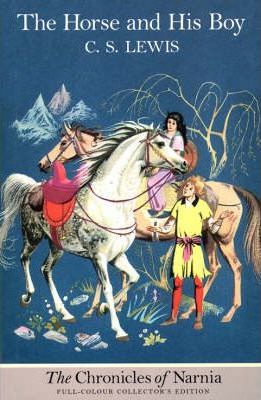
In my ongoing preparation for teaching C. S. Lewis’s Chronicles of Narnia at my church, I’ve now completed five of the seven books, the latest being The Horse and His Boy. This book is unique as being the only one where no one from our world enters Narnia; rather, it focuses on two young people, Shasta and Aravis. The former is a slave seeking the freedom he heard exists in the land of Narnia; the second is a girl fleeing a marriage to an old man. Both live in the totalitarian country of Calormen.They are accompanied by two Talking Horses, Bree and Hwin, who also want to enter Narnia, where they once lived.
I won’t go into all the details of their journey, but at various points along the way, they were chased by a lion—the first encounter forced them to meet, as they had started separately and didn’t know one another. A second direct encounter made the horses run faster than they thought they could and got them to a place of safety at a hermit’s dwelling. Shasta, though bone-weary, was immediately given the task to run to the king of Archenland to inform him of a plot by Calormen to invade his kingdom.
Shasta succeeds in that mission, yet he is in a bad state: physically exhausted and mentally despondent. In that state of mind, he begins to drown in self-pity. “I think,” said Shasta, “that I must be the most unfortunate boy that ever lived in the whole world. Everything goes right for everyone except me. . . . And being very tired and having nothing inside him, he felt so sorry for himself that the tears rolled down his cheeks.”
Lewis captures how we all have felt at times, but then also captures how God can come to us when we are at our lowest.
What put a stop to all this was a sudden fright. Shasta discovered that someone or somebody was walking beside him. It was pitch dark and he could see nothing. And the Thing (or Person) was going so quietly that he could hardly hear any footfalls. What he could hear was breathing. His invisible companion seemed to breathe on a very large scale, and Shasta got the impression that it was a very large creature. And he had come to notice this breathing so gradually that he had really no idea how long it had been there. It was a horrible shock.
When he could stand it no longer, Shasta fearfully inquired of this Presence, “Who are you?” The answer was not direct; instead, it only intensified the mystery: “One who has waited long for you to speak.” Then the Presence breathed on him and simply stated, “Tell me your sorrows.” That led to Shasta pouring out his troubles and again moaning about how unfortunate he was. “‘I do not call you unfortunate,’ said the Large Voice.” But what about those lions who chased him, Shasta complained. It is at this point that Lewis provides one of the best lessons on Divine Providence to be found in the Narnia series:

After hearing this, Shasta, more than ever, wants to know who this Voice is. David Downing, co-director of the Wade Center and author of an instructive book about Narnia, explains what happens next:

The first “Myself” that can shake the earth represents the Father; the second, which is clear and glad, is the Son; the third, that barely audible whisper, is the Holy Spirit.
As the mist clears and Shasta now sees the Lion—Aslan—for the first time, Lewis notes Shasta’s initial impression: “No one ever saw anything more terrible or beautiful.” Some might question how anything can be terrible and beautiful simultaneously, but those who have felt the Awesomeness of God can understand without question. Lewis then records Shasta’s reaction to this image:
Luckily Shasta had lived all his life too far south in Calormen to have heard the tales that were whispered in Tashbaan about a dreadful Narnian demon that appeared in the form of a lion. And of course he knew none of the true stories about Aslan, the great Lion, the son of the Emperor-beyond-the-Sea, the High King above all kings in Narnia.
But after one glance at the Lion’s face he slipped out of the saddle and fell at its feet. He couldn’t say anything but then he didn’t want to say anything, and he knew he needn’t say anything.
What will you and I do when we first see Jesus face-to-face? I think it may be the same response: falling at His feet and so overwhelmed by His presence that we are silenced due to complete reverence.
The Chronicles of Narnia are considered children’s books, but they are so much more. They can lead us to the very Throne Room of God. That’s what this passage in The Horse and His Boy has done for me.
